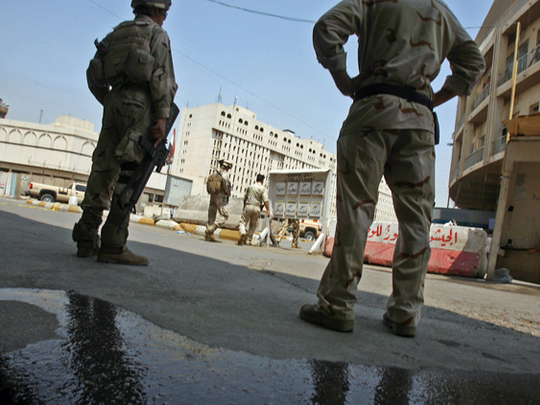
Not wanting to be painted as traitors or US lackeys, the majority of Iraqi political leaders will tell you that they do not need US forces to stay in the country beyond the December 2011 deadline.
However, military statistics and the state of Iraq today tell us an entirely different story. The country, which was "liberated" from the Baathist regime in 2003, is not ready to face the whirlwind likely to follow the US army drawdown, scheduled to be completed in December 2011.
In an interview with Gulf News, Lieutenant General Michael Barbero, Deputy Commanding General of US forces in Iraq, was asked how ready the Iraqi armed forces were to defend the country and to sustain its sovereignty.
He said the Iraqi army was well equipped and had been trained by the US to be the most capable in the region. Furthermore, it boasted plenty of experience, tremendous leaders and the forces are well equipped.
Barbero added that the Iraqi air force had 100 aircraft, including several C30s, and 57 pilots trained to fly both helicopters and fixed-wing aircraft. He said the size of the air force continued to grow, its staff having doubled from 2,700 to 5,400 in the past year.
The general expressed confidence in the ability of Iraq's armed forces to defend the country. However, though most things were in place, and there was a good foundation across all the services, he admitted that certain things were still lacking that would reduce the country's ability to counter an external threat.
The general was both frank and candid, and explained that it takes a lot of time to train pilots to fly F-16s, which would in turn take time to be delivered.
Given Iraq's notoriously porous borders, the assertion by Lieutenant General Babakir Zebari, Chief of Staff for Iraqi Joint Forces, that it would take another 10 years before the Iraqi army would be able to ensure the country's security came as no surprise.
Zebari has been criticised for making this claim at a recent defence conference in Baghdad, but the fact is that he is in the best position to make such an assessment.
However, in an interview with CNN Iraq government spokesman Ali Al Dabbagh said Baghdad had no plans to renegotiate the deadline for US troop withdrawal.
He said the government was building national defence and security forces capable of protecting their citizens, the territorial sanctity of the country and the sovereignty of the nation. Al Dabbagh added that the government was committed to maintaining good ties with Iraq's neighbours as well as countering internal discord.
Regional threat
All well and good, but will Iraq be able to stand up to neighbours that treat its territory as their own backyard?
Let's take a look at a statement made by the newly appointed Iranian ambassador to Iraq, Hassan Danaei-Far, in one of his first press conferences.
"We condemn some remarks made by Iraqi officials. We believe that it is our right to sue some of these people so that they will be prosecuted judicially," he said.
Does diplomatic protocol allow any diplomat to make such a statement in a foreign country?
If Iraq were not held in such low esteem by its neighbour, such a threat would not be heard.
What chance would Iraq have of repelling an attack from a potentially nuclear-capable Iran after the US' complete military withdrawal?
Writing in the Los Angeles Times, Liz Sly reports that the gravest concern may be Iraq's inability to defend its airspace in a region bristling with missiles and fighter planes as well as longstanding jealousies and a history of wars involving border disputes.
The Iraqi government placed its first order for 18 US F-16 fighter jets in March, but the earliest they're expected to arrive is 2013.
Sly quotes Brigadier General Scott Hanson, who heads the US mission in charge of training the Iraqi air force, as saying: "I would say we're five years into a 10-15 year programme".
A few years back, a prominent Iraqi parliament member sent me a text message as the house voted on the US-Iraq Status of Forces Agreement, saying: "Congratulations, we did it". The treaty laid out the deadlines for the withdrawal of US armed forces.
Though it seemed to be something worth celebrating at the time, today things look very different. The current agreement obligates all US forces to leave Iraq by the end of 2011, and the Iraqi government would have to renegotiate a new agreement if it wanted any to stay.
Either way, Iraq's government has a very important decision to make that will require tremendous courage.










